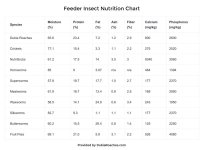Hello there, I wanted to cover a few things:
I'm pretty sure she is too young to ovulate. 7 months seems like a juvenile still and I don't think her body would be preparing for breeding at such a young age. I've seen female gecko's that take years to get into an ovulation cycle, so I don't think she would be ovulating. It's very common for reptiles to go off food for a few weeks after being acquired. Shipping and being plopped in a new environment is pretty stressful, so it's very possible she was just stressed out. Has she started eating yet?
As far as gut-loading yourself vs buying them fed, any insect you buy will need to be consistently fed. Feeding doesn't mean breeding and definitely doesn't require any extra expenses. I keep my feeder insects in a plastic kritter keeper container and put them in Eco-Earth for a substrate. Then I toss in a fresh veggies every few days. Good staple leafy greens are Collard Greens, Dandelion Greens, Escarole, Curly Endive, and Mustard Greens. You can also use de-spined cactus pad and cactus pear. Squashes are good as well, like Summer Squash, Winter Squash, Acorn Squash, Butternut Squash, and Spaghetti Squash. Those can be fed raw, you don't have to cook them first. Other fruits and veggies can be cycled through. An occasional apricot or slice of apple is fine every other week or so. You don't need artificial supplements for your feeder insects, especially if you're already dusting them with calcium and the occasional multi vitamin when feeding them to your gecko. Feeding your insects is a requirement, just like keeping her tank warm and cleaning her. It's just part of having reptiles

!
As it's been said, you don't want to keep them in the fridge. Mealworms last a crazy long time without being in the fridge and it's healthier for your gecko if the worms are active and digesting food properly.
As a last little side-note, variety is important. Mealworms are high in fat and feeding solely mealworms or superworms can lead to fatty liver disease and obesity. The healthiest feeders are Dubia Roaches, Red Runner Roaches, Silkworms, and Phoenix Worms. Crickets can be good as well but the others have better nutrient profiles. Mealworms and Superworms should be considered more like a treat or a part of a varied diet.
Don't get overwhelmed with the concept of gutloading. It's as simple as putting some leafy greens in whatever container your feeders are stored in



